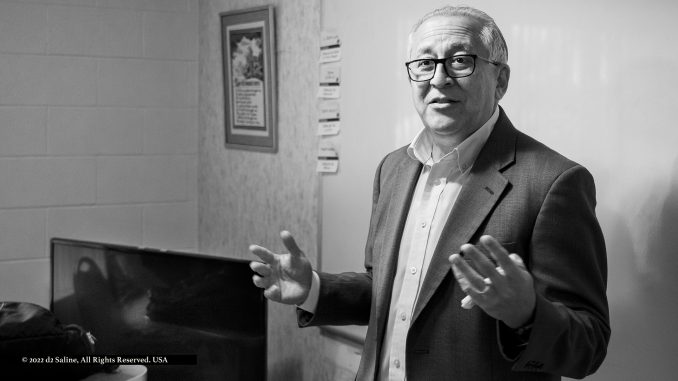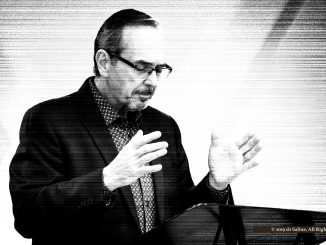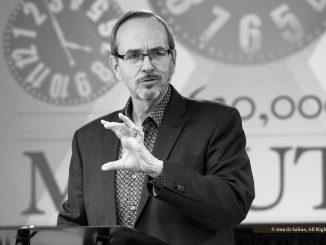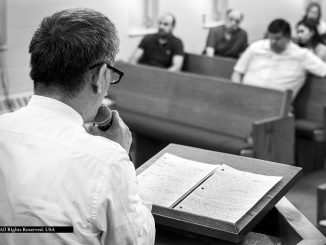
In 2019, management consulting firm McKinsey & Company addressed the topic of international business mergers with the following opener: “Understanding culture, and proactively managing it, is critical to a successful integration. [1]
This requires a comprehensive approach.
The fact that these principles could be applied to the success of North American church-plantings derived from roots literally originated from all around the globe should have come as no surprise to anyone going into the recent Southern Baptist Convention “Multi-Lingual Converation” event held earlier this month in Southeast Michigan. [2-4]
Indeed, it appeared to have been an opportunity for leverage by Dr Ramon Osorio, ethnic-linguistic team lead for the North American Mission Board (NAMB) — a pastor from Honduras who holds degrees in theology and business.
In discussing program development with Saline Journal, he spoke in terms of such designs: “We were not there to teach but to listen the pastors and leaders tell us what is keeping them from church growth and multiplication.
We also consider that in every group we had people from different countries and contexts even if they speak the same language.
Dr Tony L Lynn, Church-Planting Leader – Michigan, reinforced this point in empathy for attendees. “We want to assure them that we believe we have much to learn from them that will affect our ministries.”
The fruits of this was a program set with a schedule of just over four hours in length (with up-front anticipation of “flexibility”), bookended by unstructured interactions during breakfast and lunch. In between, formal agenda items included prayer, worship, and testimonials.
All served a center, then, of three concurrently-facilitated breakout groups intended as work sessions to open, if not advance participant dialogue on three key questions framed by Dr Lynn.
- “What are you doing?”
- “What would you like to do?”
- “How can we help?”
As Saline Journal accepted invitations to spend a bit of time with each breakout, it became readily apparent that linguistics was only one of the differences that separated approaches to collecting content for answers to the questions posed by Dr Lynn. [5,6]
One room had the feeling of a classroom; another directed people to even smaller breakout groups within its space, with individuals gathered here and there, directed to describe their personal challenges in a few words, written on large sheets of paper fixed to the walls.
Elsewhere, yet a third gathering felt like a town hall discussion — with respectful collaboration that harkened back to a time when such approaches could authentically exist and prove productive.
“There was a big difference between their backgrounds, and the cultures among them,” Dr Jeremy Sin later commented in discussion of the group discussion that he orchestrated.
Nevertheless, they share the same passion for the kingdom, and the zeal for evangelism.
The Japanese church planter is already looking for future planters, the Filipino church is looking into raising new leaders for a potential church plant.
“I believe God is a god of purpose,” Dr Aslam Masih told Saline Journal. “We are the stewards of the vision, the Calling from God.
Being strategic and goal-oriented helps us stay focused and achieve better kingdom results.
Returning to the program introduction where Dr Tony Lynn suggested a Revelation 7:9 construct and spoke in particular about successor generation challenges faced by language pastors, Dr Aslam cited the North American Mission Board for their work here.
“NAMB’s vision is ‘Planting churches everywhere for everyone.’
I believe we need to preserve both first and second generations.
It has already been proven by fact that many ethnic churches are starting separate worship services in English language under the first-generation church leadership, but still preserving the culture.
Dr Tony and I attended Arabic church last Sunday: They worship together, and then a separate worship has been started for second and third generations in their ‘heart language’ — English.
“God led our conversations,” Dr Osorio stated with apparent satisfaction as he summarized outcome of this gathering as a whole.
They were candid and will lead us to discover ways to participate in moving, together, the needle of church strengthening, growth, and multiplication.
As those inputs from May 21 are assessed, put into organized plans, and become tangible actions, Saline Journal will report on results as opportunities become available.
This is the final installment of three-part coverage that began with “Part 1: Call to act, published Friday (May 27), and “Part 2: Testimonials,” which run yesterday (May 29, 2022). [7,8]
References
- “Organizational culture in mergers: Addressing the unseen forces” Oliver Engert, Becky Kaetzler, Kameron Kordestani, and Andy MacLean (March 26, 2019) McKinsey & Company.
- “North American Mission Board” (NAMB) Southern Baptist Convention.
- “SEND Network” NAMB.
- Southern Baptist Convention (SBC) (home page).
- “Chapter 5: The ‘Ethnic Church’” (May 7, 2014) Pew Research.
- “The most and least racially diverse US religious groups” Michael Lipka (July 27, 2015) Pew Research Center.
- “Baptist State Convention of Michigan hosted ethnic-linguistic event to support new church startups, Part 1: Call to act” Dell Deaton (May 28, 2022) Saline Journal.
- “Baptist State Convention of Michigan hosted ethnic-linguistic event to support new church startups, Part 2: Testimonials” Dell Deaton (May 28, 2022) Saline Journal.



